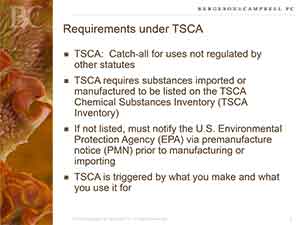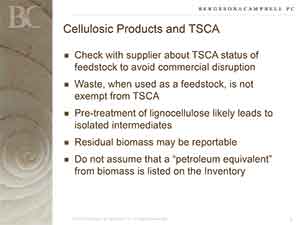Richard E. Engler Presents TSCA And The Cellulosic Revolution At ABLC2016
On February 18, 2016, Richard E. Engler, Ph.D., Senior Chemist at Bergeson & Campbell, P.C. (B&C®), presented at Cellulosic Fuels: First Commercials and Beyond, a session at the Advanced Bioeconomy Leadership Conference 2016 (ABLC2016). Dr. Engler’s presentation, “TSCA and the Cellulosic Revolution,” covered Toxic Substances Control Act (TSCA) nomenclature, inventory, and model manufacturing process issues for cellulosic products. The presentation discussed the differences in nomenclature between Class I and Class II substances on the TSCA Inventory, and what regulatory responsibilities are triggered by different uses of substances. While cellulose is a naturally occurring substance, it is only automatically included on the Inventory if it is unprocessed or if it is processed using only a few narrowly defined methods that specifically exclude chemical modifications. This definition results in chemical notification requirements that may not be anticipated by companies unfamiliar with TSCA.
Dr. Engler fielded several questions from session attendees during the Q&A period. In response to a question regarding whether biobased fuel and chemicals produced in Europe, China, or Brazil would face regulatory requirements similar to TSCA, Dr. Engler confirmed that many substances would be regulated by the European Union’s (EU) Registration, Evaluation, Authorization and Restriction of Chemicals (REACH) regulation, by Decrees Number 7 and Number 591 in China, and by similar but less well-defined programs in Brazil. He also stated that B&C affiliate The Acta Group (Acta®) offers expert guidance for companies doing business in Europe, Asia, and South America.
Dr. Engler was also asked if a mixture made of substances, all of which can be found on the TSCA Inventory, would be subject to a new listing on the Inventory. He responded that a mixture of TSCA-listed substances would not be subject to additional reporting requirements, but that many biobased substances are of more variable composition, and would be considered unknown or variable composition, complex reaction products and biological materials (UVCB). He advised companies to get some expert help in identifying the correct identity of their products and processes.


For more information or to request copies of the presentation materials, please contact rengler@lawbc.com.
